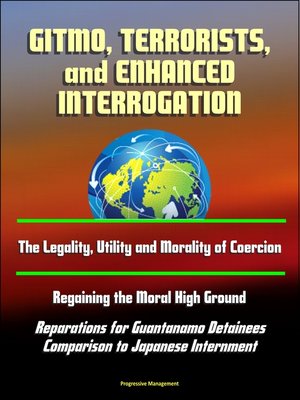GITMO, Terrorists, and Enhanced Interrogation
ebook ∣ The Legality, Utility and Morality of Coercion, Regaining the Moral High Ground, Reparations for Guantanamo Detainees, Comparison to Japanese Internment
By Progressive Management

Sign up to save your library
With an OverDrive account, you can save your favorite libraries for at-a-glance information about availability. Find out more about OverDrive accounts.
Find this title in Libby, the library reading app by OverDrive.



Search for a digital library with this title
Title found at these libraries:
| Loading... |
This is a digital reproduction of several academic research papers regarding GITMO, the handling of terrorists and enemy combatants, and the use of enhanced interrogation. These documents are professionally converted for accurate flowing-text e-book format reproduction.
Contents: Regaining the Moral High Ground on Gitmo... Is There a Basis for Released Guantanamo Detainees to Receive Reparations? * Combating Terrorism: The Legality, Utility and Morality of Coercion
Subject terms: Reparations, Guantanamo, Detainees, Compensation, Human Rights, Humanitarian Law, American Principals, Military Commissions Act, Detainee Treatment Act, Law of War, torture, enhanced interrogation, detentions.
In the aftermath of the terrorist attacks on America on September 11, 2001, U.S. leaders were determined to avoid another strike against the nation. As part of their efforts in the ensuing Global War on Terror, America's leaders authorized the use of coercive techniques during prisoner interrogations to gain intelligence deemed crucial to national security. The policies and procedures that emerged have brought the legitimacy of coercive techniques, which some view as torture, to the forefront of the political debate. This paper focuses on the legality, utility and morality of coercive interrogation techniques employed for the sake of state security.
When Osama bin Laden's al-Qaeda terrorist network struck America on 9/11, the country now faced a "new kind of enemy in the first war of the twenty-first century."2To combat that enemy the Bush administration, according to former Vice President Dick Cheney, "developed a program to gain intelligence from detained terrorists that saved lives and prevented future attacks." This program involved the use of coercive interrogation techniques by the Central Intelligence Agency (CIA); in the opinion of advocates such as Cheney, the "program was safe, legal, and effective." To its critics, the techniques constituted torture and were both immoral and ineffective. As stated by President Barack Obama, "Brutal methods of interrogation are inconsistent with our values, undermine the rule of law, and are not effective means of obtaining information."






